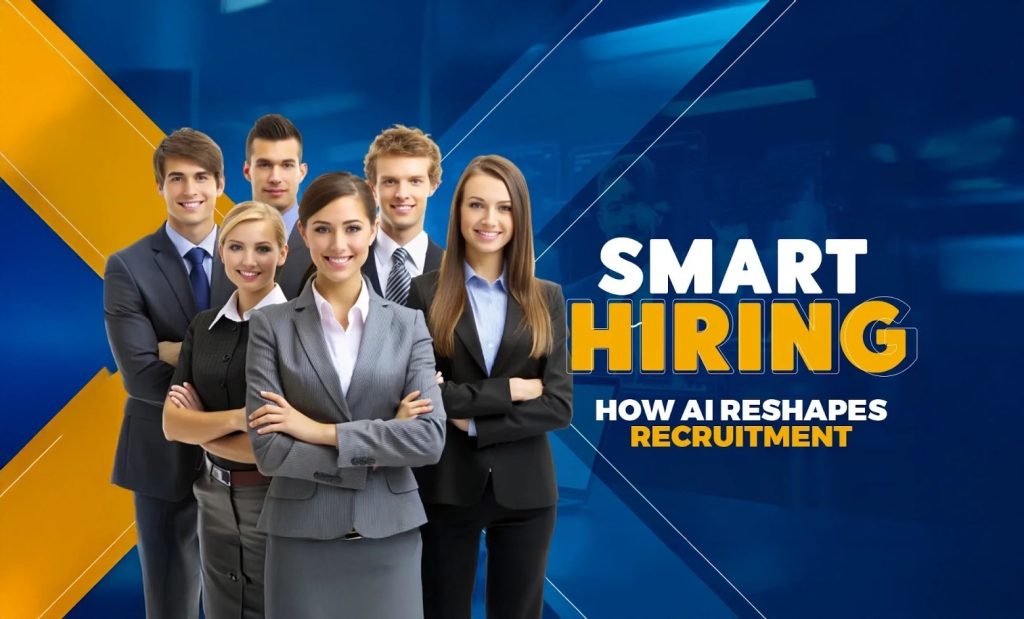How AI is Reshaping Recruitment: Smarter Hiring for a Smarter Future
In today’s fast-paced professional landscape, recruitment is undergoing a radical transformation. The infusion of Artificial Intelligence (AI) into the hiring process is not just a fleeting trend—it’s a technological shift that’s redefining how businesses identify, assess, and engage talent.
Gone are the days of sifting through piles of resumes and relying solely on gut instincts. Today, AI-powered tools are streamlining recruitment, making it faster, more data-driven, and more equitable.
From Manual to Machine: A New Era in Hiring
Traditionally, recruitment has been a labor-intensive process involving resume screening, phone screenings, interview coordination, and subjective evaluations. This model, while familiar, often leads to inefficiencies and human error.
Now, AI is flipping the recruitment funnel on its head. With automation and analytics at the core, the process is becoming:
- Automated, reducing repetitive tasks
- Data-driven, enabling evidence-based decisions
- Scalable, handling large applicant volumes efficiently
Game-Changing AI Tools in Recruitment
Several cutting-edge platforms are leading this transformation:
- HireVue uses AI-driven video interviews to assess candidates’ facial expressions, tone, and word choices, offering insights into their soft skills and personality traits.
- Pymetrics employs neuroscience-based games to measure cognitive and emotional traits, matching candidates to roles based on compatibility.
- LinkedIn Talent Insights leverages big data to help recruiters identify emerging talent pools, competitive hiring trends, and skill gaps.
These tools don’t just screen candidates—they analyze, predict, and recommend, optimizing every stage of the hiring journey.
Key Benefits of AI in Recruitment
The advantages of integrating AI into the hiring process are clear:
- Faster Time-to-Hire
AI handles administrative tasks—like resume parsing and interview scheduling—at lightning speed, significantly reducing hiring cycles. - Reduced Human Bias
When designed ethically, AI can shift focus from subjective traits (like name or background) to objective data points such as skills, experience, and job fit. - Enhanced Candidate Experience
With chatbots offering real-time communication and AI systems giving timely updates, candidates enjoy a more responsive and transparent process.
Ethical Considerations and Challenges
Despite the benefits, AI in recruitment raises important ethical questions:
- Algorithmic Bias: If AI systems are trained on biased data, they can unintentionally reinforce discrimination.
- Data Privacy: With massive volumes of personal data processed, protecting candidate information is critical.
As AI becomes more embedded in hiring, transparency, fairness, and accountability must remain central to development and deployment strategies.
Looking Ahead: The Future of AI-Driven Hiring
The future promises even more innovation. AI is already being used to:
- Predict workforce trends, helping companies proactively address skills shortages.
- Provide personalized career recommendations, supporting both internal mobility and external job matching.
Picture a recruitment landscape where AI-powered virtual assistants support HR teams, offering real-time labor market intelligence and suggesting tailored job matches to candidates. This isn’t science fiction—it’s the direction we’re heading in.

AI is not replacing recruiters—it’s empowering them. By automating routine tasks, reducing bias, and enhancing decision-making, AI helps recruiters focus on what matters most: building strong, diverse, and high-performing teams.
For job seekers and employers alike, the message is clear: embracing AI in recruitment is no longer optional—it’s essential.
For further assistance, visit our channel and refer the video
Smart Hiring : How AI Reshapes Recruitment | @turilytix #bigai

References
- Gartner. “77% of Recruiters Now Use AI to Streamline Hiring Processes.” Gartner Research, 2023.
- HR Technologist. “Top AI Tools Revolutionizing Recruitment.” HR Technologist, 2024.
- Binns, Reuben. “The Ethics of Artificial Intelligence in Recruitment.” Harvard Business Review, 2021.
- Deloitte Insights. “The Future of Work and AI: How Automation Is Changing the Workplace.” Deloitte, 2023.
Share This :

